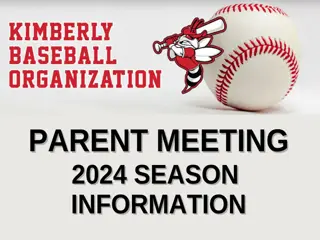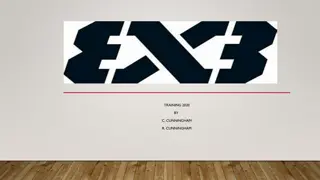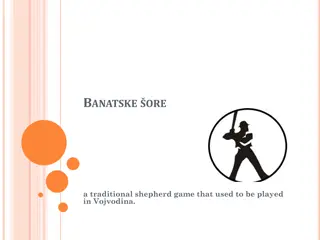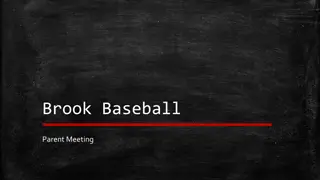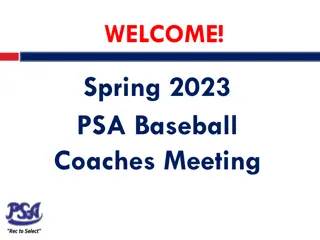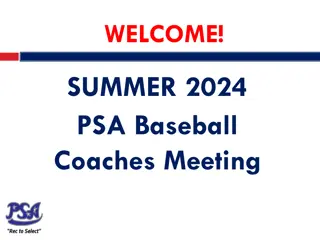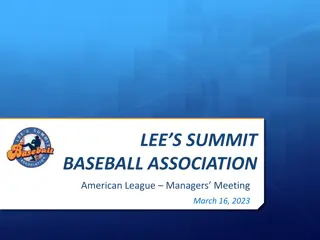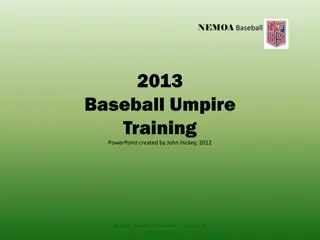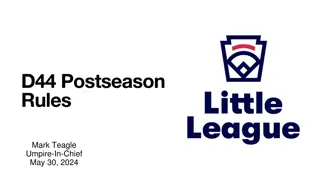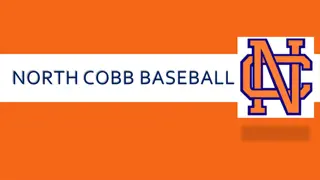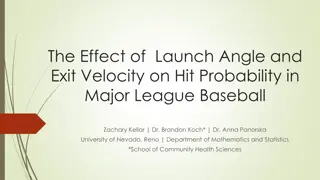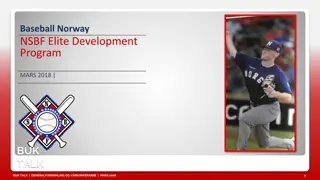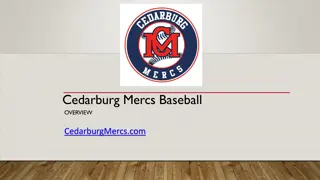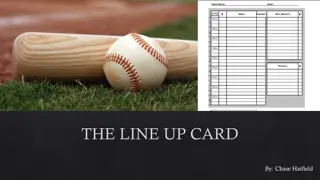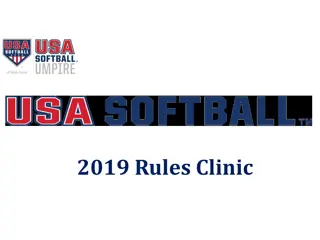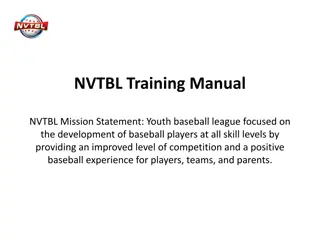Baseball Game Rules and Procedures
Learn the essential rules for starting and ending a baseball game, including umpire meetings, defensive positions, continuous batting order, base coaches, code of conduct for managers, coaches, and players, ejections protocol, and umpire conduct guidelines.
Download Presentation

Please find below an Image/Link to download the presentation.
The content on the website is provided AS IS for your information and personal use only. It may not be sold, licensed, or shared on other websites without obtaining consent from the author. Download presentation by click this link. If you encounter any issues during the download, it is possible that the publisher has removed the file from their server.
E N D
Presentation Transcript
Rule 4.00 Starting and Ending the Game
Rule 4.00 4.01 Umpires shall meet with both managers before the game. Once the meeting is over, get the game started. Note We do not carry lineup cards. That responsibility is on the teams. 4.02 Home team takes the defensive positions first. Visitors hit first. 4.03 All defensive players shall be in fair territory. Exception: Catchers. Their position is in foul territory in their box. Note: Thrown intentional walk Both feet must remain in the catchers box until the ball leaves the pitcher s hand.
Rule 4.00 4.04 The batting order shall be followed throughout the game. CONTINUOUS BATTING ORDER All eligible players will bat in their assigned spot throughout the game All players are considered starters. No players are 7.14 eligible. Players that have to leave are simply skipped. No automatic outs. If the player returns, they go back in their original spot. No penalty. Late players are placed at the end of the lineup.
Rule 4.00 4.05 The offense shall have 2 base coaches. Base coaches may be the manager, coach, or players. Base coaches are REQUIRED. Players must wear helmets that meet the specs defined in 1.16. Coaches do not have to wear a helmet. Coaches must remain in the box. Coaches cannot alternate between boxes during the inning. Remember: 1 adult must be in the dugout at all times. Coaches shall only talk to their team. Penalty: Remove the coach from the box, not the game.
Rule 4.00 4.06 No manager, coach, or player shall: Incite spectators. Use foul or derogatory language towards other players, coaches, umpires. Attempt to cause the pitcher to commit an illegal pitch/balk. Take position to deliberately distract the batter. Umpire action: 1stoffense, warn the offender. Subsequent eject.
Rule 4.00 4.07 - EJECTIONS
Rule 4.07 - Ejections Once ejected, managers and coaches must leave the field immediately. Players will leave when a parent/guardian can take them home or if they can drive away. If no parent/guardian is around, they MUST remain on the bench under adult supervision until one arrives to take them. We are responsible for that player until their parents regain custody! Remaining ejected players shall not participate in any way. All ejections carry a mandatory minimum 1 game suspension. Umpires cannot increase.
Rule 4.07 - Ejections Umpire conduct Remain as calm as you can during a confrontation with a manager. Note: We only talk to managers! Do not raise your voice. Do not speak faster than normal. Allow the coach to make his argument one time. Do not let them repeat. Calmly tell the manager what you saw. Once the confrontation is over, calmly walk away. If the coach follows you, try not to say anything that opens the door for more arguing. If coach restarts the argument, let them know that s enough. At this point, it s the manager s choice to eject himself or not! Do your best to keep participants in the game. We are not in the business of ejecting people. Managers can question calls the right way. It is not necessarily an attempt to show you up.
Rule 4.00 4.08 When a bench shows violent disapproval to a call: First, warn the bench. If the bench does not heed, eject the offender(s). If you cannot determine the offender(s), you have the authority to clear the bench. The manager ONLY will recall the players needed to complete the game. 4.09 A team scores when a player legally touches First, Second, Third, and Home in order before three outs are made. Runs do not score if: A force out is made. A preceding runner fails to touch a base. (appeal play)
Rule 4.00 4.10 Regulation games Major baseball 6 innings (5 if home team is winning) Jr/Sr baseball 7 innings (6 if home team is winning) If tied after regulation, extra innings 4.10 If a game is called, it is regulation if: Major baseball 4 completed innings (3 if home team is winning) Jr/Sr baseball 5 completed innings (4 if home team is winning) 4.10 10 run rule takes effect: Major baseball after 4 innings (3 if home team is winning) Jr/Sr baseball after 5 innings (4 if home team is winning) NOTE: Before June 1, both interleagues have local rules modifying regulation games. The 10 run rule is not modified to match those rules.
Rule 4.00 4.11 The score of a regulation game If a game is called during an incomplete inning, the score reverts to the last completed inning. This includes when: Visitors score to tie or take the lead and the home team fails to regain the lead. 4.12 Tie games resume from the exact point they are suspended. DSUA purposes If suspending a game, report to the assignor. If resuming a tie game, the assignor will instruct you on pricing. The rest of 4.12 will be the responsibility of the local league. 4.13 Double Headers are permitted at all levels. 4.14 The umpire(s) shall order lights to be turned on when light conditions become hazardous. SAFETY FIRST, cost second! 4.15 Forfeits will be handled by local league administration. DSUA clarification If facing any situation defined in the rulebook, alert the home manager that the umpire crew is leaving. Bill normally.
Rule 4.00 4.16 Games may not be started or continued with less than 9 players and/or no approved adult in the dugout. In these situations, games will be suspended. No forfeits, even for ejections. 4.17 If a team cannot field 9 players due to injury, illness, ejection, the opposing manager shall choose a player to re-enter the game. Ejected players are not eligible. This is specifically for when no substitutes are eligible to return. 4.18 Forfeited games Umpires shall sign the scorebook and complete an incident report. DSUA purposes Suspended games will require a scorebook signature and a call to an assignor.
Rule 4.00 4.19 Protests Protests are only considered due to a misapplication of a rule or ineligible player or pitcher. Managers shall announce their intent to protest to the umpire immediately before any succeeding play. The umpire crew shall meet and discuss the situation. If the umpires are convinced the decision is in conflict of the rule(s), they shall reverse the decision. If the umpires are convinced their decision is within the rules, announce the game is under protest. Protests involving the use of an ineligible player or pitcher must be made before the umpires leave the field. If discovered during the game, the umpire shall remove the player from the mound or the game. The protesting manager may decide to continue the game under protest or not. AVOID PROTESTS WHENEVER POSSIBLE!!!






